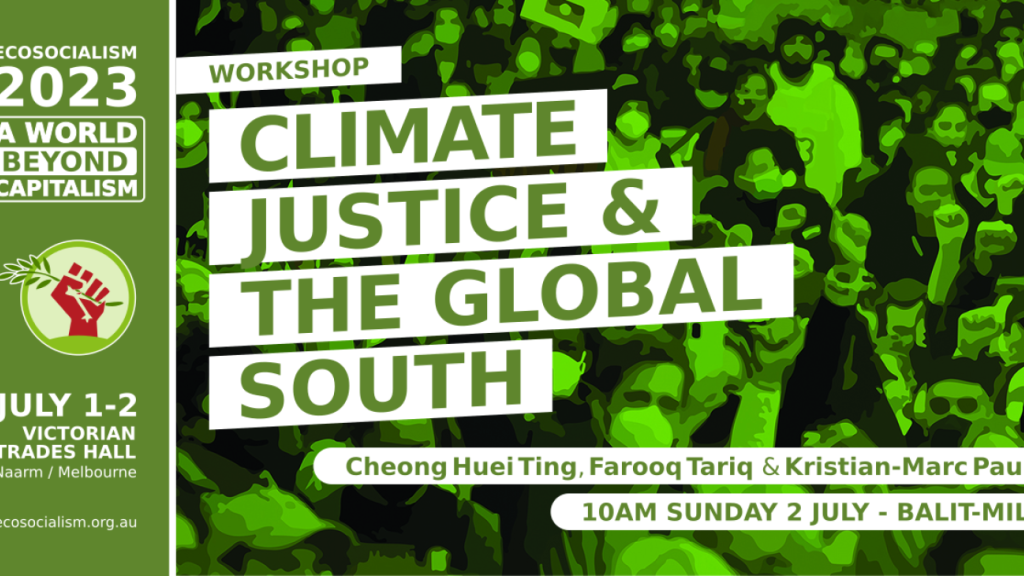Farooq Tariq: Ecosocialism, Pakistan and countries of the South

Speech given at Ecosocialism 2023.
Comrades, distinguished guests and fellow advocates for change:
I stand before you today at this Ecosocialism conference and am grateful for the opportunity to address the pressing issues that affect not only Pakistan but also countries in the Global South. It is an honor to share this platform with esteemed speakers, including the renowned Japanese philosopher Kohei Saito.
Together, we strive to shed light on the intertwined challenges of climate change, inequality, and neoliberalism. We recognize that the time for action is now.
Climate change has emerged as an existential threat, demonstrating itself in a multiplicity of ways. These include not only rising sea levels, wilder weather conditions, forest fires, deadly droughts and large-scale species-extinction, but also mass migrations and a host of social and environmental problems.
Intertwined with this crisis are also the crises of food security, water security, health, housing, social reproduction and everything that concerns sustaining life on the planet.
Clearly, no other crisis has affected human and non-human life in such an immense manner in recent history.
While the Global North is also witnessing the naked visibility of climate-induced changes, there is an overbearing sense of disproportionality with which the crisis impacts countries in the Global South.
As I speak, many of the cities in Sindh, Balochistan and Punjab are experiencing heatwaves surpassing even the very high levels of previous years. Just a few months ago, one-third of Pakistan was drowned in water as a consequence of climate-induced floods.
The situation in Pakistan’s neighboring countries is equally intense. The rain-induced floods, heatwaves and smog are not uncommon to India. Bangladesh and Sri Lanka are equally, and at a certain level even more, vulnerable because of their coastal situation.
Countries in greater Asia, Africa and Latin America are not far behind either. In other words, the Global South is not just at risk of being enormously damaged but has already been damaged to an irreversible degree, despite having contributed negligibly to the climate crisis.
The obvious question that comes to mind is the following: what is being done to avert this enormous crisis? Broadly, the response from the existing system can be summed up in the mitigation-adaptation matrix. The idea is to mitigate the severity of the crisis by making certain adjustments without transforming the coordinates of the system.
We, however, argue that the climate crisis, unlike many previous socio-economic and political crises, cannot be overcome within the bounds of global capitalism. Indeed, this is the only crisis that challenges capitalism in an unusually deep as well as broad manner. It demands a new worldview, a new economic and political order.
Instead of clinging to the system that prioritizes profit over people and the environment, and commodifies and exploits nature, the climate crisis is a reminder that the existing economic and political order has arrived at its point of exhaustion. It is imperative that we reject this profit-driven model and advocate for an alternative path — one rooted in ecosocialism.
Ecosocialism offers a vision that transcends the false dichotomy between ecological sustainability and social justice. It recognizes that the climate crisis cannot be overcome without addressing the underlying structures of power and inequality.
By redefining the relationship between humans and nature, ecosocialism calls for a just transition that prioritizes the needs of communities and the preservation of our planet.
In the context of Pakistan, such an approach to climate change and inequality means pursuing policies that prioritize social welfare, equity, and environmental justice. It entails resisting large-scale environmental degradation and the real-estatization of land led by the military, politicians and real-estate mafias. It also means preserving our water bodies, undertaking land reforms, promoting sustainable agriculture and protecting indigenous communities' geographies and their knowledge systems.
But even if Pakistan manages to do all of that, it will not be enough. The severity and the urgency of the climate crisis calls for a coordinated internationalist effort. To begin with, we would like to suggest a South-South environmental alliance.
But given the breadth of the crisis, even that will not be sufficient. We need a strong internationalist network of resistance — one that is attendant to the disproportionality the South experiences and one that does not fall prey to climate colonialism. Only ecosocialist internationalism can pave the way for such a future.
Farooq Tariq is President of Haqooq Khalq Party and General Secretary of Pakistan Kissan Rabita Committee.